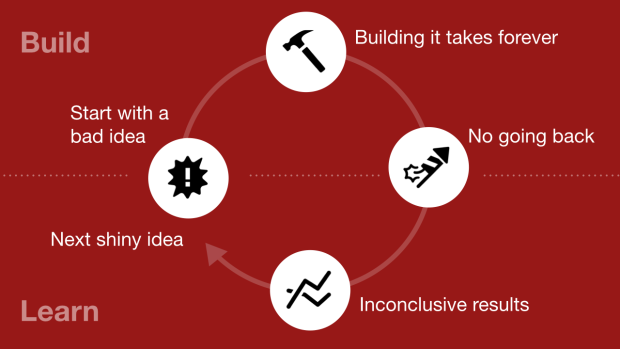10 Mistakes You Will Make as a First Time Entrepreneur

Creating your first startup might seem easy – I have an idea, I will hire a ‘techie’, find investors and voila. ‘Wantrepreneurship’ is fun until you step into the world of entrepreneurship within the real startup scene. It might seem luxurious and easy from the outside, but once you plunge into it you will realise how many challenges it takes to become a successful entrepreneur.
This article was originally posted on HYBE.
It’s no longer a surprise that some 90% of startups fail, but the good news is that failure does lead to success if you are consistent enough to keep on trying.
So you want to to be an entrepreneur, the next Larry Page or Mark Zuckerberg?
Before jumping into it, avoid the common mistakes and follow the advice we are about to give you.
1. Micromanaging and being ‘too busy’
Delegate, delegate, delegate – This is what you have to learn early on. It doesn’t mean you should sit and do nothing as the founder of the company, but you need to know what you as the CEO need to focus on. In the early stages of your business, you need to focus on customer engagement, raising capital and finding product-market fit, but not micromanaging and trying to be involved with everything. Micromanaging your team is just slowing down the whole progress, and all you are doing is just getting in the way. This is the point where all CEO’s of startups tend to become ‘too busy’ all the time. Your first recruits are the most important, choose them carefully, trust them; and learn to delegate.
2. Working yourself to death or ‘half-assing’ it
An average successful exit might take 7-10 years, it could take 1-2 years to raise your first round of investment. Working 80-100 hour weeks might seem like something you must do when setting up your own business and being a role model to your employees, but you might burn out faster than you would imagine. You want to create a good healthy work environment. Take care of yourself and you will last longer, work smarter not harder. On the other hand, don’t even think about starting a business as a side project. It could work out in the beginning (if you don’t want to take the risk of quitting your job right away) but sooner or later you need to take that step, to focus fully on your own business, if you are serious about doing something remarkable and making money. Nobody invests in you when you are only in it part-time.
3. Avoiding your team
Your team is your company, and keeping your team happy is one of your top priorities. Happy developers build better products, happy marketeers will find ways to keep your CAC lower, happy account managers will keep your clients happy and bring you more revenue. You need to be able to keep your people motivated. Whether it’s good times or bad times, you cannot hide yourself behind the desk. As a leader you have to take responsibility and show that you can handle anything. Even if you have doubts about your own decisions, you must never show this to your employees.
Ideas change, products are redesigned, markets can take unexpected turns, but people tend not to change that much. In the end you don’t build a business, you build the people who will build your business.
4. Getting emotionally attached to the idea and avoiding the market
It’s common that as a founder you will fall in love with your idea, and while launching your product it might seem like giving birth to something really innovative and beautiful. However, later when introducing your beautiful baby to the market it turns out that it’s ugly. You don’t succeed just because you think you have a brilliant idea or product. If consumers are not willing to adopt it, you are doomed. So, instead of dreaming how your product will change the world, make sure it actually does change something, and you have users who need it and are ready to pay for it.
5. Being overly secretive about your idea
“I can’t talk about it yet. I don’t want anyone to steal my idea. Even you might steal it, so I won’t talk about it yet.” How often have we stumbled upon this?
Don’t, just don’t be overly secretive about your idea. You will never find a product-market fit if you don’t talk about your idea.
Go out there, talk to people, to your friends, mother, grandmother, potential investors, colleagues, even your dog. If your idea is rubbish, it’s better to realise it sooner rather than later; you might be talking to your potential customers already. If they don’t need it or believe in it, nobody else will except you. If you think that people really want to steal your idea, you are wrong.
6. Obsessing over the competition
Don’t build a product that already exists. If you decide to build something that already exists, make sure you are giving better value. Ask yourself, ‘What are they doing that I could do better?’ Think about what you could do differently to win this market.
First-time entrepreneurs tend to think that you always have to compare yourself to competitors. You do need to do your homework – market research, yes, but why build a product like your competitors?
As Evan Reas, the co-founder of Hawthorne Labs once said, “If you spend all your time looking at your competition, your product will end up looking like your competitor’s ass.”
Talk to your customers, ask what they want and forget about spying on your competitors, because you might already have something better than they do. Your customers will tell you what they need and that’s the only way you can build a better product than your competitors.
7. Trying to make a product for everyone
When trying to please everyone, you please nobody. You cannot build a product to serve two different kinds of customer. You just don’t have the resources, time and money for it. You have one product to serve one specific market and that’s how you should start. The biggest threat is to lose yourself in all the new opportunities that come about through brainstorming, or from various customers requirements. You need to find the mediocre. If you discover that you really need to change your product to fit the market, then go all out, but don’t try to please everyone.
8. Bad money management
Every day will cost you money. Starting with rent, then salaries, utilities, recruiting and customer acquisition.
Before you even start, create a plan and financial forecast along with assumptions. Keep your receipts, track your expenses, create budgets and be aware where your cash is going. Stop ignoring revenue and comparing yourself with giants like Facebook who didn’t have to think about revenue until years after being funded.
9. Thinking in the ‘now’
When teaming up with friends to build a company, most first-time entrepreneurs think about the present. If you don’t agree the amount of time you dedicate to build the company right form the beginning, months later one of you will be working over the weekends with the other one most likely having all the holidays. Then you might find yourself saying, ‘Wait a minute, I’m doing your job, how come you have 50% of the company?’ But at this point it might already be too late. Make the arrangements early on to make sure you are on the same page about the future of your business and how much you both put into it.
10. Planning for ‘perfect’
Another tricky question is, ‘Should I open the shop now, or should I wait a bit more to make it perfect?’ Well, when your product is perfect, by the time you launch you are already too late!
Build the MVP (Minimal Viable Product) and go to market, test the product and then polish it to perfection after receiving feedback from your clients. Be aware that your business model will most likely change after you have talked to your clients.
Many things can go wrong when starting your first company, and sometimes you can’t avoid mistakes. In fact you’ll make plenty of them. The key is to learn from your mistakes and not to give up.





